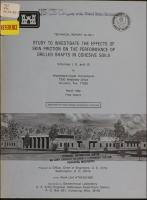Please use this identifier to cite or link to this item:
https://hdl.handle.net/11681/13070| Title: | Study to investigate the effects of skin friction on the performance of drilled shafts in cohesive soils. Volumes 1, 2, and 3 |
| Authors: | Woodward-Clyde Consultants |
| Keywords: | Friction Skin friction Shafts Excavation Soils Soil mechanics Soil testing Cohesive soils Soil physics Houston, Texas |
| Publisher: | Geotechnical Laboratory (U.S.) Engineer Research and Development Center (U.S.) |
| Series/Report no.: | Technical report (U.S. Army Engineer Waterways Experiment Station) ; GL-82-1. |
| Description: | Technical Report Abstract: The general objective of this study was to investigate the effects of skin friction on performance of drilled shafts in cohesive soils. The investigation was conducted and discussed here in three stages : field, laboratory, and theoretical analyses. Four test shafts were constructed in 1969 at a test site located in southeastern Houston, Texas, where detailed subsurface exploration and soil characterizations had been made. Load tests on the carefully instrumented test shafts produced high-quality data documented in a series of reports made available to the public. For this study, a thorough subsurface investigation was performed to provide a detailed evaluation of the soil and groundwater conditions existing at the test site. Representative samples of the subsoils were obtained for laboratory analyses. Pressuremeter tests, borehole shear tests and static cone penetrometer soundings were also conducted. The geotechnical laboratory investigation was conducted to provide a characterization of the in-situ soil properties and parameters as well as their state-of-stress. Tests to investigate the pertinent physical and index properties of representative soil samples were conducted. Direct shear, triaxial compression, and one-dimensional consolidation tests were conducted to evaluate the strength and deformation characteristics of the in- situ soils. Both consolidated isotropic undrained triaxial compression (CIU) tests with pore pressure measurements and unconsolidated undrained (UU) tests were performed. The coefficient of earth pressure at rest (Ko) was evaluated. Special direct shear tests were run to assess the redidual strength of the soil. Tests were conducted to investigate mortar-soil interface shear characteristics as a simulation of shaft-soil interaction under load. The effect of soil property changing with time was also investigated. Various methods of evaluating the ultimate shaft friction of drilled shafts in cohesive soils were described and assessed. Evaluation of ultimate shaft friction was first made by theoretically based techniques, such as Alpha (α), Beta (β), and effective stress methods, which utilized basic soil properties to predict shaft friction. Subsequently, other techniques were investigated including application of laboratory soil-mortar interface shear measurement and in-situ borehole shear test. The application of moisture migration concepts to the prediction of shaft friction was also investigated. The load-settlement analysis selected for this study focused on a numerical load-transfer technique. This work included derivation of load-transfer curves from load test results, prediction of the load- settlement response of these shafts, and the comparison of these data to the actual measured data. Note: This file is very large. Allow your browser several minutes to download the file. |
| Rights: | Approved for public release; distribution is unlimited. |
| URI: | http://hdl.handle.net/11681/13070 |
| Appears in Collections: | Technical Report |
Files in This Item:
| File | Description | Size | Format | |
|---|---|---|---|---|
| TR-GL-82-1.pdf | 33.31 MB | Adobe PDF |  View/Open |